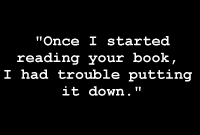

 |
 |
|
|
Play the Ball, Not the Playerby Matthew Arnold Stern This was a non-manual speech I gave as an extended ed spot on how we can make Toastmasters a safe place to express themselves. This is a good speech to give if you have members who want to talk about controversial issues, but are afraid of offending people. After reading this speech, see "Make Your Club a Safe Zone" for further thoughts. How many of you have kids who play sports? For those of you who don't, let me explain that sports give us parents the opportunity to have our kids run around on a grassy field and chase a ball, while we spend hundreds of dollars for the privilege to do so. We pay to sign our kids up for the league, the uniforms and all the equipment that goes with them, for the obligatory fundraisers where we wind up buying all the overpriced stuff they have to sell, and for the obligatory pizza parties after each game. When you think about it, you can accomplish the same thing by buying a 79 cent rubber ball at Wal-Mart and having your kids run around the park. However, I am a big believer in sports. I believe our kids learn a lot from them, and we parents can learn even more. There is one lesson that applies specifically to us in Toastmasters. Earlier this year, our daughter Stephanie was in a soccer league. She had an excellent coach. One of the lessons he taught her was "play the ball, not the player." This means that when the opponent is on offense, and he's heading towards your goal with the ball, you try to kick the ball away from him. You don't kick the player on the shins. You don't knock the player down, get him in a headlock, and give him noogies. You only go after the ball. The same rule applies to us in Toastmasters. One of the things that I've always stressed is that we want to make Toastmasters a safe place for people to express themselves:
So, how do we make Toastmasters a safe place for both? We certainly don't want to impose some politically correct self-censorship where people are afraid to tackle controversial subjects. We don't want to turn out mealy-mouthed vapid speeches about empty subjects because we're afraid to step on people's toes. That is where the rule applies: play the ball, not the player. We go after issues, not the people who express them. For the audience, "playing the ball" means that we listen respectfully and attentively to every speaker, regardless of whether we agree with them or not. In the course of my Toastmasters career, in all the different places I've been to, I've heard some speeches that really made my blood boil. I found myself biting my tongue so hard, I thought I'd be speaking with an impediment for the rest of my life. But, I remember that I must listen to them attentively, because I want the same respect shown to me when it's my turn to speak. We must also remember that our responsibility as Toastmasters is to enable every speaker to be their best, regardless of their point of view. We're all here to support each other. For you speakers, "play the ball, not the player" applies to you too. It means you go after the issue with gusto, not the people who people who share the opposing view. As an example, let me take a simple, non-controversial issue: parking meters. Suppose that I, from an Ayn Rand/libertarian point of view, believe that parking meters are the government's heavy-handed attempt to dictate where we can park and for how long and that they infringe on our inalienable right to park wherever we want. Of course, I'll express my point of view passionately. I might also say why I disagree with those who believe parking meters are a good thing. What I won't do is called people who support parking meters "morons" or "parking fascists." Instead, I will show respect to the opposing side. When you respect the opposing view, you make your argument so much more stronger. You will gain the respect of those who don't agree with you, and you will have a better chance of swaying those who might be tempted to join your side. By "playing the ball, not the player," you not only make Toastmasters a safe place for people to express themselves, you will become a much stronger and much more convincing speaker. So, remember what Stephanie's soccer coach taught her, and you'll be able to score your goals as a speaker and a Toastmasters club.
Related TopicsLinksToastmastersInternational Founder's District Toastmasters
|
| |
|
|
|||